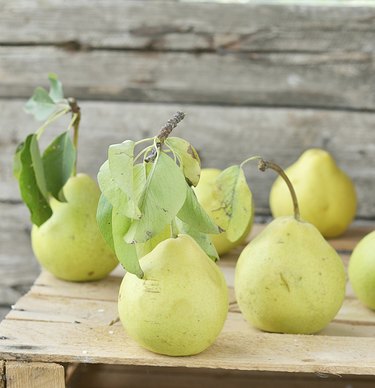Things You'll Need
Paring knife or vegetable peeler
Cutting board
Saucepan
Immersion blender, blender or food processor
Fine-mesh strainer
Wooden spoon or silicon spatula
Sugar or lemon juice (optional)

A perfectly ripe pear is one of the sweetest and most fragrant of all fruits, but that moment of perfect ripeness is cruelly brief. Turning the ripened fruit into pear nectar is one way to extend your enjoyment of their brief season. Pears don't release their juice as readily as do oranges and other fruit, but pear nectar -- a pear puree thinned to drinking consistency -- is easy to make and requires no special equipment.
Step 1
Peel your pears with a paring knife or vegetable peeler, taking care to remove as little flesh as possible with the skin. Place the cut pears on a cutting board and quarter them lengthwise; then use a paring knife to cut out the core, seeds and blossom end.
Video of the Day
Step 2
Chop the pears coarsely; transfer them to a heavy-bottomed saucepan, and add 1/4 cup of water. The water provides steam to soften the pears and help release their natural juices, and it helps keep them from sticking to the pot during the first few minutes of cooking.
Step 3
Simmer the pears until they're just barely tender. The less they're cooked, the fresher their flavor will remain.
Step 4
Puree the pears with an immersion blender or in small batches in a conventional blender or food processor. Press the puree through a fine-mesh strainer with a wooden spoon or silicon spatula to remove any stray seeds or pieces of core or skin.
Step 5
Thin the puree with cold water until it reaches a drinkable consistency; then taste it. Add fine, quick-dissolving sugar or an alternative sweetener if the nectar is tart or a splash of lemon juice if it's cloyingly sweet. Refrigerate the puree immediately, or package it and freeze it for later use.
Tip
If you're preparing a large quantity of pears for storage and long-term use, don't thin the puree. It will take up less space in your freezer if it's frozen in its concentrated form.
The pear puree can also be canned in sterilized canning jars and then stored in your pantry or any other cool, dark place. This eliminates the need for freezing and thawing, so you can quickly turn your puree into pear nectar whenever the mood should strike.
Nectar is not 100 percent juice, and commercial versions can't be sold as "juice" for that reason. In some jurisdictions, they can contain as little as 25 percent juice. Homemade versions are a healthful beverage, but commercial fruit nectars can be high in sugar or other sweeteners.
Video of the Day